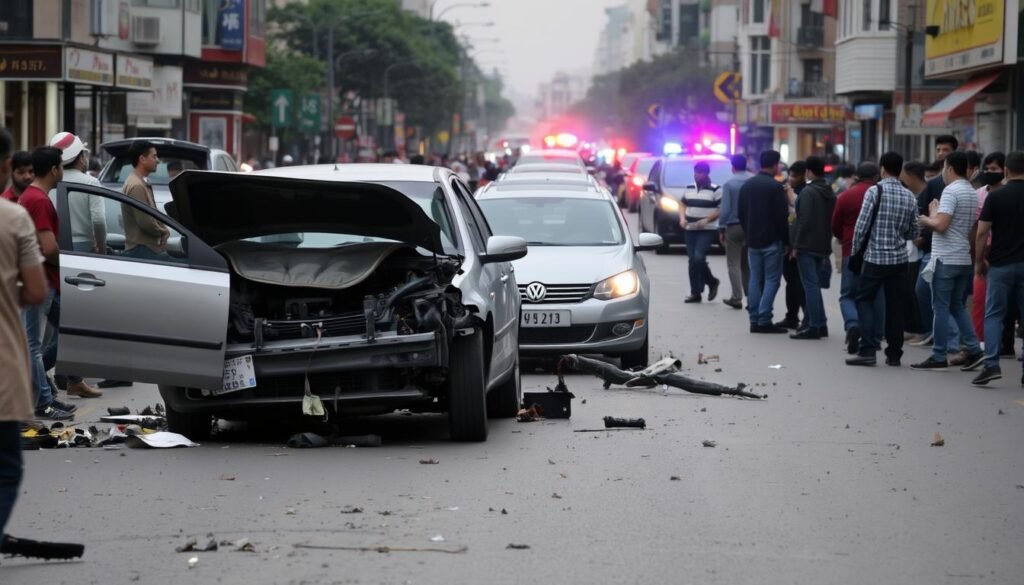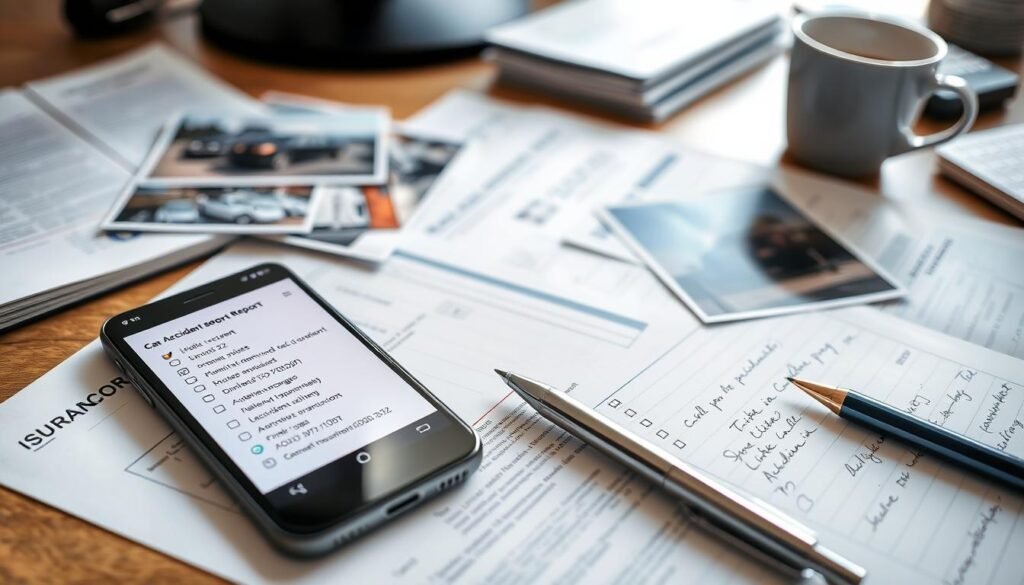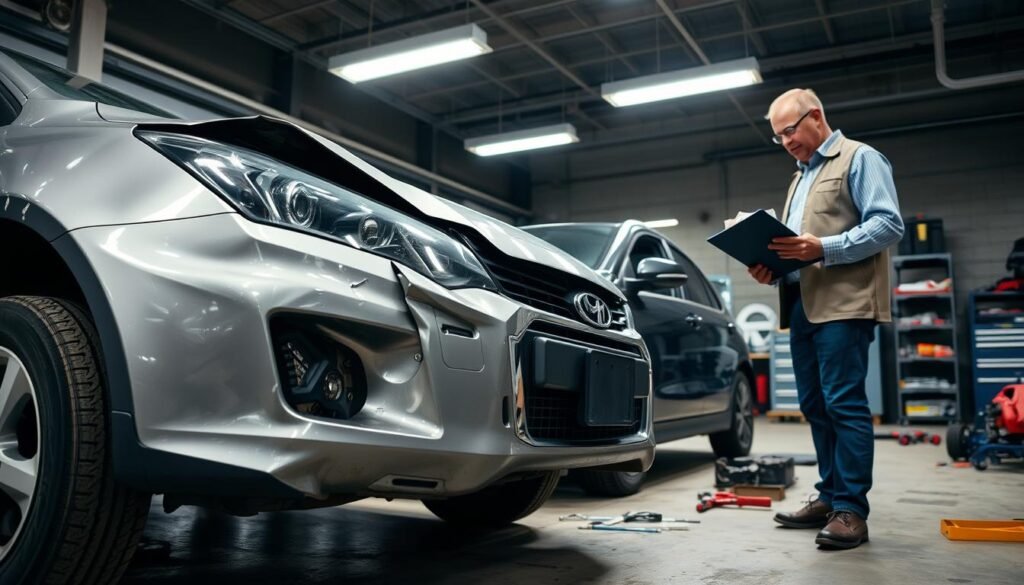Have you ever been in a car accident and didn’t know what to do next? It can be really confusing right after it happens. But don’t worry, we’re here to help. This guide will show you the important steps to follow when filing a car insurance claim.
We’ll talk about how to make sure the accident scene is safe and how to talk to your insurance company. If your car got damaged, you got hurt, or you’re dealing with tricky insurance rules, we’ve got you covered. This article will give you the info you need to make smart choices and move forward.
Key Takeaways
- Prioritize safety and secure the accident scene to prevent further incidents.
- Gather essential information from the other driver(s) and document the accident with photos and notes.
- Promptly notify your insurance company and provide accurate details about the incident.
- Understand your insurance coverage and the claims process to ensure you receive the appropriate compensation.
- Collaborate closely with the insurance adjuster to facilitate a timely and successful resolution.
Take Immediate Action at the Accident Scene
Right after a car accident, make sure everyone is safe. Move your car to the side of the road if you can. This keeps you safe and lets you think clearly.
Call for help if someone is hurt. In New York, you must swap info with the other driver for legal reasons. Get their name, address, phone, insurance, and driver’s license details.
- Take lots of photos of the accident. Include license plates, car damage, and any marks on the road.
- Talk to any witnesses who saw the accident.
- Get medical help right away, even for small injuries. This makes a record of the accident and your health.
These steps help with your accident scene protocol and personal injury evaluation. Good accident report documentation helps with insurance and protects your rights after the accident.

| Action | Importance |
|---|---|
| Move vehicle to safety | Prevents further collisions |
| Call emergency services | Ensures prompt medical care |
| Collect driver information | Fulfills legal requirements |
| Document the scene | Provides evidence for insurance claims |
Contact Your Insurance Company
After the accident, tell your insurance company right away. It’s key to file claims and document the accident well. Call your insurer quickly, even if the accident seems small.
Notify Your Insurer Promptly
Tell your insurance about the accident’s date, time, and place. Also, share info on the other driver(s) and any witnesses. They will start a claim and send an adjuster to look into it.
Share Accident Details
Be ready to give details about the accident. Talk about what happened, any injuries or damage, and who was there. This info makes the claims process faster and helps your insurer understand the situation.
Cooperate with the Investigation
Work with the adjuster during the investigation. Give them any needed documents like photos, police reports, or repair quotes. Keeping in touch with your insurance company helps solve the claim fast and gets you the coverage you need.

Notifying your insurance quickly starts the claims process. It helps them fix or replace your vehicle faster. These steps reduce the stress of filing claims after a car accident.
What to do after a car accident: Understand Your Coverage
After you’ve made sure everyone is safe and called your insurance, look at your policy. This helps you know what you’re covered for. It makes sure you get the most from your insurance and helps you through the claims process.
Review Your Policy
Take time to really look at your car insurance policy. Learn what it covers, like damage to your car, injuries, and rental cars. Remember your deductibles and coverage limits. These affect how much you’ll pay out of pocket.
Understand Deductibles and Coverage Limits
Know your policy’s deductibles. These are what you pay before your insurance helps. Also, remember your coverage limits. These tell you the most your insurance will pay for repairs, replacements, or medical bills.
Inquire About Additional Coverages
You might have extra coverages in your policy that help after an accident. This could be for rental cars, which cover the cost of a car while yours is fixed. Ask your insurance about these extra coverages and their limits.
| Coverage Type | Description | Typical Limits |
|---|---|---|
| Property Damage Liability | Covers damage to the other driver’s vehicle or property | $25,000 – $100,000 |
| Bodily Injury Liability | Covers medical expenses for the other driver and passengers | $50,000 – $250,000 per person, $100,000 – $500,000 per accident |
| Collision | Covers damage to your own vehicle | Varies based on vehicle value and deductible |
| Rental Car Reimbursement | Covers the cost of a rental car while your vehicle is being repaired | $30 – $50 per day, up to $900 – $1,500 per claim |
Knowing your car insurance coverage helps you handle claims better. It makes sure you get what you’re supposed to after checking for damage, injuries, and looking at rental and repair options.
Work with the Insurance Adjuster
After your insurance company knows about the car accident, they’ll send an insurance adjuster to look into it. It’s key to work well with the adjuster for a good outcome. You might need to give them things like repair estimates, medical records, and other important evidence.
The adjuster’s job is to collect info, figure out who was at fault, and talk about a fair settlement. It’s good to know how they work and help them out. Don’t say anything you don’t want to on the side or say you were at fault, as it could hurt your claim.
Cooperate with the Adjuster’s Investigation
Answer the adjuster’s questions and give them any docs or info they need. This could be:
- Repair estimates for your car
- Medical records and proof of your injuries
- Details about the accident, like where it happened, when, and who saw it
Understand the Claims Process
The adjuster will help you get your car fixed or replaced if needed. They’ll also figure out how much you should get for your personal injury evaluation and other losses. Be patient and work with the adjuster to get a fair deal on your claim.
“Providing detailed information about injuries to an insurance adjuster might not be advisable soon after an accident due to evolving diagnoses.”

Remember, insurance adjusters work for the company, not for you. It’s important to know their role and avoid saying things that could hurt your claim. If you’re not sure what to do, talking to a personal injury lawyer can help. They can make sure you get the compensation you should have.
Conclusion
Follow this guide to handle a car accident’s aftermath well. Make sure you’re safe, collect all needed info, talk with your insurance, and know your policy. Work with the insurance adjuster too.
It’s key to document the accident, swap contact and insurance info, and get medical help right away. Even for small injuries. These steps help your insurance claim and legal case a lot. Being proactive and informed reduces stress and costs from a car accident.
If you’re hurt or don’t know your rights, think about talking to a personal injury attorney. They can guide you and help you get the right compensation. By doing this, you can deal with a car accident well and move forward.
FAQ
What are the immediate steps to take after a car accident?
First, make sure everyone is safe. Move your car to a safe spot away from traffic. Call 911 if someone is hurt and needs help.
Get the other driver’s details like name, address, phone, insurance, and license. Take pictures of the accident, including car damage, skid marks, and traffic signs.
How do I file a car insurance claim after an accident?
After making sure everyone is safe, tell your insurance about the accident. Call them right away, even if it was a small crash. Give them the accident details, like when, where, and who was involved.
Also, share info about any witnesses. Your insurance will start a claim and send an adjuster to look into it.
What should I know about my car insurance coverage?
Before you file a claim, check your insurance policy. Know what it covers, like damage to your car, injuries, and rental cars. Remember your deductibles and coverage limits too. They affect how much you’ll pay out-of-pocket.
How do I work with the insurance adjuster?
When your insurance contacts you, they’ll send an adjuster to look into your claim. Work with them by giving them what they need, like repair quotes and medical records. They’ll help you with fixing or replacing your car.
